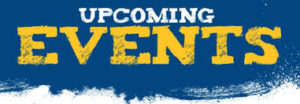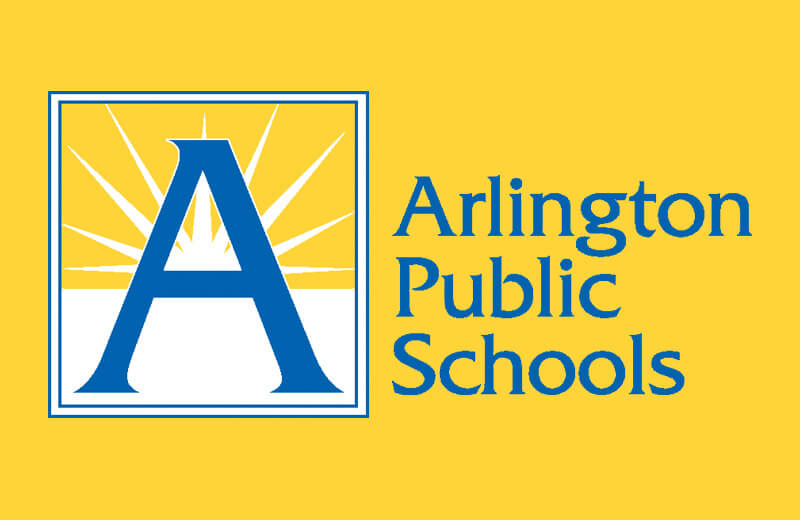We hope everyone had a happy, healthy and relaxing Thanksgiving Break. As mentioned in our message last week, we are excited to be offering TWO Lunch and Learn sessions this week.
Join us on tomorrow, Tuesday, November 29th at noon, to learn more about CRISIS SERVICES across the lifespan for individuals experiencing mental health and/or substance use issues. It is critical for families to know how to find help before a crisis arises for a child or an adult, so log in at lunch time and join us for information that could be useful for your family or others that you care about. Register now at: https://forms.gle/KnqtnUDaVYvNXw8J9
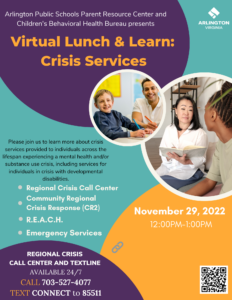
On Thursday, December 1 at Noon, our Autism/Low Incidence Disability Specialists will offer Autism 101 – an opportunity to learn more about how autism may impact social and communication skills, executive functioning, and sensory processing. Strategies for success will also be introduced.
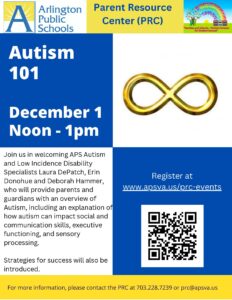
IEP/ISP Progress Updates
As a reminder, each time regular progress reports are sent home, progress on Individualized Education Program (IEP) goals and objectives are also posted in ParentVue. The key listed below delineates how progress is measured on the IEP/ISP toward attainment of each annual goal and objective identified in the IEP/ISP.
| ES | Emerging Skill |
| IP | Insufficient Progress demonstrated to meet this annual goal and annual goal may not be achieved within duration of IEP/ISP |
| M | Mastered |
| NI | Not yet introduced |
| PD | Previously documented performance not yet demonstrated |
| PN | Progress not yet demonstrated |
| SP | Sufficient Progress |
If you have any questions related to identified goal and/or objective progress, and/or if you would like a hard copy, please contact your child’s case carrier.
From APS in AACtion: Playtime AACtivities – AAC on the Playground
 By Daphney Denerville-Davis and Erin Tokajer, AAC Implementation Coaches
By Daphney Denerville-Davis and Erin Tokajer, AAC Implementation Coaches
(Daphney and Erin offer individual family AAC coaching sessions for families. Email them at the link above to schedule a coaching session.)
Play is often talked about as if it were a relief from serious learning. But for children, play is serious learning. Play is really the work of childhood. – Fred Rogers
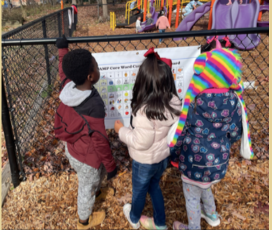
To foster our students’ communication across all environments in an inclusive school community, APS is putting core vocabulary boards on every elementary playground throughout the county. Making communication accessible to all students on our playgrounds promotes socialization, friendship, self-advocacy, safety, and fun! Access to core boards on the playground is important for the 200+ high-tech AAC users throughout the county because it can serve as a low-tech option or modeling tool. These boards also benefit our emerging communicators, English learners, and young readers by offering a means to develop and expand language through the use of symbols and text.
Tips for using AAC and the core vocabulary boards on the playground:
- Engage children in adult-facilitated play (e.g., help coordinate a game of Hide-and-Seek or Duck-Duck-Goose).
- Attribute meaning to childrens’ behaviors and actions (e.g., when the student points to the slide, say “Oh, you want to go down the slide!”)
- Point to words on the board as you say them (e.g.,”Let’s go down the slide!” – point to go on the board).
- Students who have them should bring their AAC devices to the playground as well.
- Encourage peers to use the core vocabulary boards as well, they are for everyone!
- Have fun!
“I love the idea of bringing AAC to a wider community. Helping all of our students become passionate communicators is a meaningful path for community building.– APS Staff member
Please visit our Events page at aps2016.apsva.us/prc-events for up to the minute event information and registration links.
 Contact
Contact  Calendars
Calendars Careers
Careers Engage
Engage  District
District


